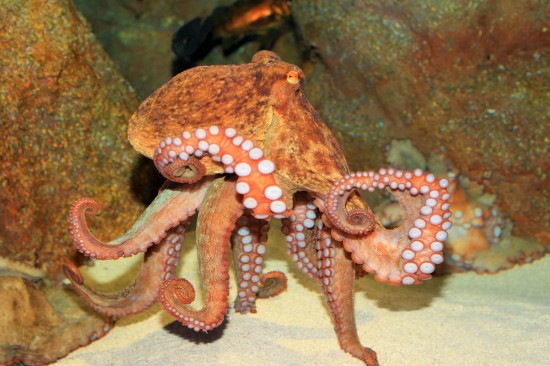

If you are looking for a pet that is highly unusual, very exotic and sure to prove a conversation piece, you would be hard-pressed to find anything more out of the ordinary than an octopus!
There are a great many different species of octopus in the world, ranging from the enormous inhabitants of the largest, deepest oceans to very small specimens that can live happily within a domestic aquarium. However, keeping an octopus requires a lot of research before you go ahead, and a good grounding in the basics of their care and natural environments, as well as an understanding of the set up and lifecycle of a marine tank. While they might be a good pet for a first time keeper that is prepared to do lots of research first, they are more likely to thrive under the care of an experienced marine fish keeper.
If you are intrigued by the idea of having a pet octopus and want to find out more, this article will tell you about some of the basics to get you started. Read on to find out more!
Over all, the housing and set up requirements for a small octopus are broadly similar to that for saltwater marine tanks, and if you are experienced with the keeping of a coral reef tank, you will already have a head start. However, you should dedicate a tank to keeping your octopus only, as they are very challenging to keep with other marine life such as fish and corals, unless you have a commercially sized aquarium in which to keep them!
The octopus has a very high metabolism, meaning that they eat a lot and produce a lot of waste, requiring a very efficient and potentially expensive filtration system and sump tank to process waste.
They must have flowing water, so lots of water pumps are essential to set up water movement, and they require low-level lighting, which can make the tank look rather dim. Essentially, the filtration and water movement of the tank should be similar to that of most other marine tanks, but minus the lighting requirements and the presence of fish and corals.
Giving your octopus their meals also gives you the chance to tame your octopus and get them to interact with you, and octopus are highly intelligent animals with distinctive personalities, who will soon come to recognise their handler and when they are going to get a meal! Octopuses are obligate carnivores, meaning that they must be fed animal products, and some species will only eat live food, which can make feeding them a challenge.
Octopus tend to eat a variety of live shrimp and crabs, and smaller fish. If your octopus is already tame and used to life in captivity, they may well eat frozen and defrosted food, but octopuses are very individual in terms of their feeding preferences, so it is vitally important to find out what they like to eat, and stick to it!
Well, this depends; the short answer is pretty much no, as octopus do have a tendency to eat the fish or other organisms that share their tanks with them! Added to this, octopuses are rather antisocial loners, and do not even usually tolerate the presence of another octopus without either fighting with them, or the larger one eating the smaller one!
Octopuses are very clever predators and can easily outwit most fish, crustaceans and other live tank mates, turning your other potentially expensive purchases into a tasty snack! Added to this, the types of marine animals that are not potential meals to your octopus might actually harm them or see them as their own food, particularly corals and inverts with spines or stings.
Over all, unless you are a highly experienced marine keepers, you would be unwise to try to house other forms of life alongside of your octopus.
Octopuses need to have a firmly secured tank, with a sturdy lid that is clipped and weighted down to prevent escape. Thanks to their high intelligence levels, flexible bodies and strong limbs, octopuses are adept at removing the lid of many different types of tanks in order to go for a wander around, and so ensuring that your tank is octopus-proof is essential! Octopuses can also stretch themselves out to become very thin, and able to pass through small gaps with ease; a general rule of thumb is that the octopus can potentially get themselves through any opening that is wider than one of their eyes!
All of the filter and aeration fittings of the tank should be covered with mesh over the openings to prevent your octopus from climbing up into them, and no small gaps should be left uncovered at the top of the tank.
Copyright © 2005-2016 Pet Information All Rights Reserved
Contact us: www162date@outlook.com